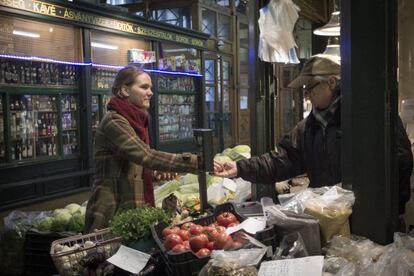Eastern Europe is sick of inferior food
The governments of Hungary, Slovakia and Czech Republic claim that some multinationals are sending them lower-quality products compared with their neighbors to the west

Mrs Irén, 81, goes shopping almost every day. It’s not just to get out of the house, which she likes. Nor is it just to chat with her neighbors or to enjoy the fruit tea and cake that she orders religiously every morning at one of the cafés in the noisy Fény Street market, in the west of Budapest. This retired nuclear engineer likes to shop for food every day, but sticks to a strict list of trusted products. “My husband and I don’t trust just any brands, particularly foreign makes. Do you know that some send worse quality food to Hungary than to elsewhere?” she says, as though revealing a secret.
But the urban legend that multinationals sell worse quality fare to Eastern European countries (which began joining the EU in 2004) than to their neighbors in Germany and Austria has in fact been circulating for years.
Several months ago, a number of Eastern European governments actually came out and complained that their citizens were being discriminated against, and decided to prove it by analyzing dozens of products. The Hungarian authorities found a certain brand of pizza with less cheese than in Germany and Austria. In Slovakia, they discovered butter biscuits that were in fact made with palm oil. In Slovenia, there was ham with less pork content than the same ham sold to western neighbors. And in Romania and Bulgaria, it transpired that Fanta and Coca Cola are sweetened with maize syrup instead of sugar.
Although the industries concerned said that these discrepancies have nothing to do with quality, the issue has stirred a lot of anger and questions are now being asked, such as, does the same thing happen in other places in the EU? Does it happen in countries in the south? Is there a class system at play in Europe in terms of consumption?

In the words of István Rados, a 61-year-old car salesman, making his way to work through the Budapest traffic: “It’s a disgrace. They treat us like the poor neighbor who will accept anything.”
According to a survey conducted several months ago by the authorities, Rados belongs to the 70% of Hungarians who have noticed the difference in taste between products sold to them and those sold to their German and Austrian counterparts.
“There are more than a few multinationals that sell poorer quality goods to Eastern Europe, reducing the fruit, meat or vegetable content and adding more salt, fat and sugar,” says the Secretary of State for Food, Robert Zsigo from his office inside one of the palaces that sit on the banks of the Danube. “There’s a double standard. And that doesn’t mean that these products are proportionally cheaper here.”
Zsigo doesn’t mention that Hungary, with its 9.8 million inhabitants and a minimum salary of not quite €750 a month, has one of the highest tax rates on consumer products in the world at 27%. Spain’s rate, for example, is 21%, though many foods are taxed at 10% and 4% and in the US it’s generally below 13%. This high tax rate can have repercussions not just on the consumer but also on the producer who alters the composition of the product to maintain the profit margin.

Clearly, the gulf between the EU’s Eastern and Western members is centered around the sensitive stomach area. And now the age-old rumor that chocolate and coffee are better in Germany and Austria is fueling the nationalist debate, particularly among governments such as Hungary’s populist and increasingly Europhobic ruling party, which has taken full advantage of the apparent discrimination to promote its ideals.
“Because of our history, we are generally afraid of everything and anything in Hungary,” says Réka Szőllősi, director of the National Federation of Food Processors EFOSZ, who complains bitterly that Víktor Orbán’s government is refusing to discuss the matter.
According to the processed food sector, the analysis carried out by the food authorities is not scientific enough and EU standardized tests should be employed. “We are the first to want malpractices flagged up and punished, if differences are indeed found,” says Szőllősi. “But those that have been mentioned are due to a number of factors such as manufacturers promoting the use of local ingredients, or a change of recipe to suit consumer tastes in each country. For example, Hungarians have very conservative taste, so you don’t get the exotically flavored yogurts that you might get in places such as Spain.”
The Hungarian government, however, declared that the EFOSZ’s explanation was absurd. “We have found fish fingers with far less fish in them than in Austria or Germany,” says Zsigo. “Are they saying that Hungarians prefer bread to fish, or palm oil to butter? Hungarian consumers are not stupid.”
Almost every Hungarian household can come up with at least one example of inferior quality being peddled to the Eastern European market, but Nutella chocolate spread is the most common. In a neighborhood to the north of the capital, 39-year-old architect Gábor Kovacs is making supper for his two small children. He opens his state-of-the art fridge to reveal fresh food and dairy products. “We try to avoid processed foods, although we do make some exceptions like Nutella, because the children love it. And it’s a fact that the Austrian version tastes better,” he says.

But if it has the same name, packaging and brand, the content should be identical. Otherwise, according to Swedish Euro MP Anna Maria Coraza-Bilt, Vice President of the Committee on the Internal Market and Consumer Protection (IMCO), it could be construed as unfair competition. “All consumers in Europe should enjoy good, healthy food without any discrimination,” she says.
Hungary has proposed that the European Commission should force companies to recognize the double standard with a label so that consumers can decide whether or not to accept inferior treatment. Alarmed at the prospect of another battle with the increasingly restless and united countries of Eastern Europe, the Commission has agreed to study the matter closely. “We should help the national authorities to end this illegal practice,” said Jean-Claude Juncker, the head of the European Commission, in late September. So far, the EU has financed standardized analysis in the target countries to the tune of €1 million.
But Vera Jourová, the EU Commissioner for Justice, Consumers and Gender Equality, is not happy with the label proposal. She is convinced there is a double standard and she demands that companies simply stop indulging in it. “If this is not corrected, I won’t hesitate to advise consumers not to buy these products,” she says.
It’s a disgrace. They treat us like the poor neighbor who will accept anything Budapest local István Rados
While some companies have not gone so far as to recognize malpractices, they have declared changes to their products. The German brand Bahlsen, for example, will now offer Pick Up! Biscuits made with butter in the East, and HiPP has announced plans to improve baby food recipes for Croatia which have previously included less vegetable content. Others, such as Dr Oetcker, have simply changed the label or packaging. Their Hawaii pizza sold in Eastern Europe for instance, now has a label that reads “Special Edition” – which roughly translates as less pineapple, ham and mozzarella than in Austria.
Hungarian authorities say that in the wake of the analysis that, they claim, proves the issue is not just an urban legend, more citizens are shopping across the border. In Sopron, a pretty town just 20 miles from Austria, a substantial number of inhabitants are making the trip to Austrian supermarkets. “Particularly for processed products,” says Katalin Horvath, who works at a local clinic. Others go there for cleaning agents. “You have to use more Hungarian detergent to get the same effect,” says Sarolta Molnar, a law lecturer at Budapest University.
Molnar believes that the time when Eastern Europeans would accept inferior quality just because they didn’t know any better is over. “During communism, there was no alternative,” she says. “You could buy two kinds of product and there was no choice. So people didn’t wonder if there was anything else. Now that people are traveling more and are familiar with a wider range of products, they realize that there are differences. And that these are not fair.”
English version by Heather Galloway.
